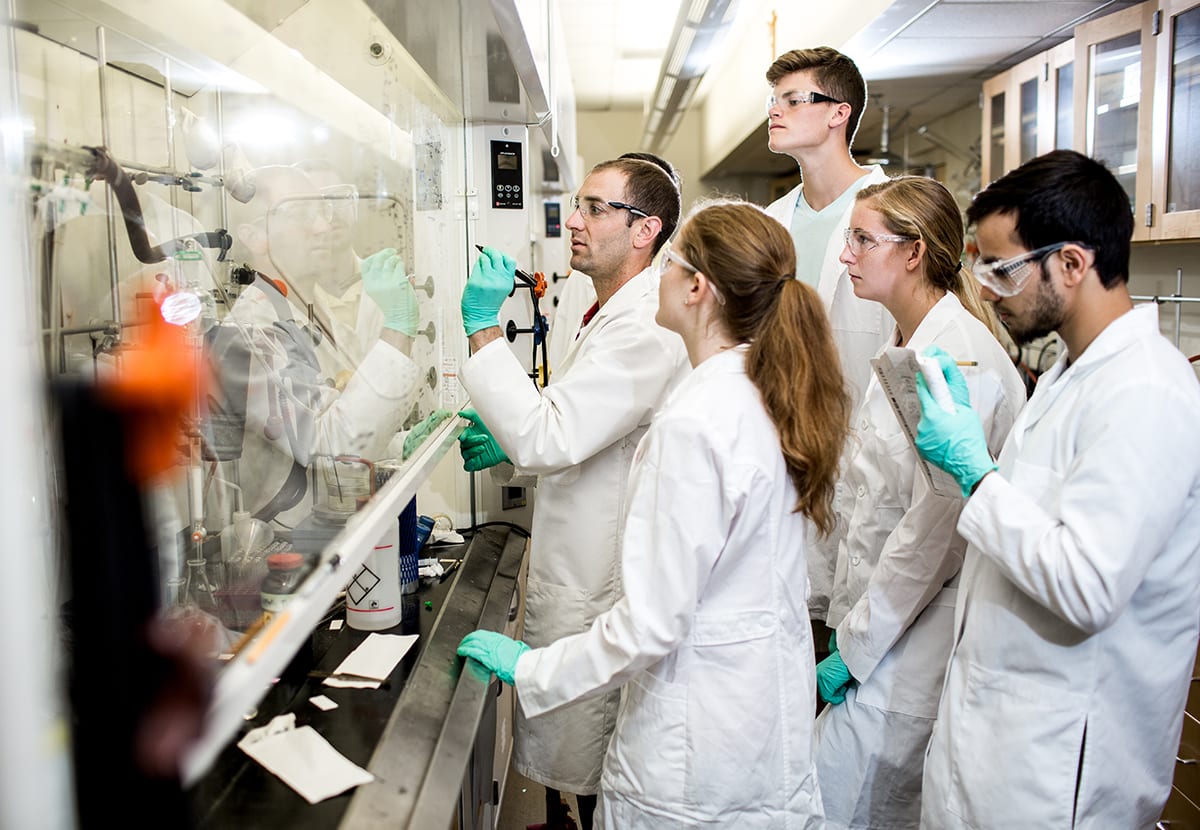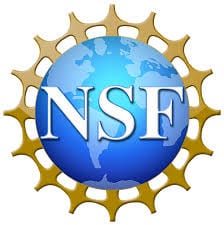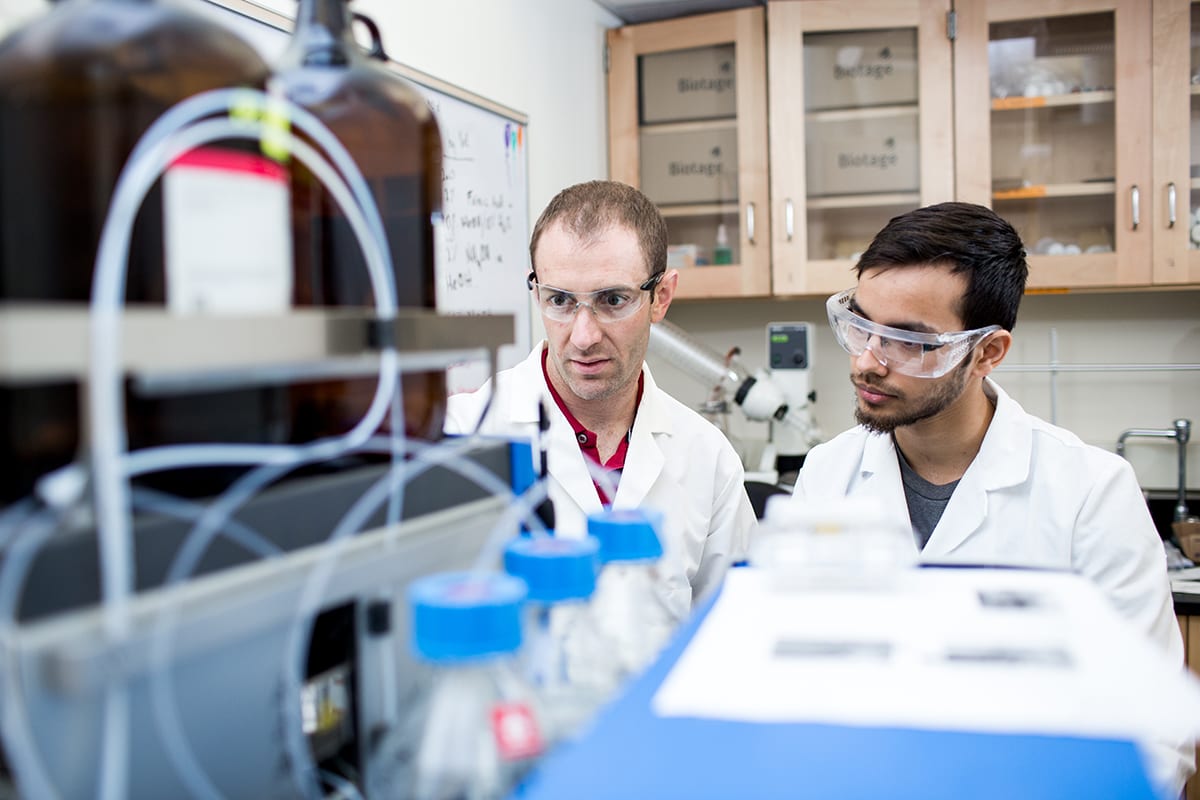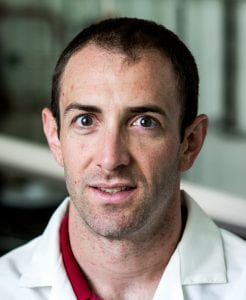Mulcahy: Chemistry department, students to prosper from 1st NSF grant

By CHARLES C. JOYCE
Dr. Seann Mulcahy, associate professor of chemistry, takes an outside view when analyzing the value of his initial National Science Foundation (NSF) grant.
The first faculty member in the Providence College Department of Chemistry and Biochemistry to earn an individual NSF grant, Mulcahy is thrilled by what the honor means to his department and the research students he mentors.
 The $191,371 award from the NSF’s Chemical Synthesis Program will fund collaborative research on Mulcahy’s project, “RUI: Synthesis of Isomeric Carbolines by Tandem Palladium Catalysis.” The three-year grant, which runs through August 2019, is the most significant research award Mulcahy has received to date. It builds on previous awards from the National Institutes of Health’s Rhode Island IDeA Network for Excellence in Biomedical Research program, the American Chemical Society, and the Rhode Island Foundation.
The $191,371 award from the NSF’s Chemical Synthesis Program will fund collaborative research on Mulcahy’s project, “RUI: Synthesis of Isomeric Carbolines by Tandem Palladium Catalysis.” The three-year grant, which runs through August 2019, is the most significant research award Mulcahy has received to date. It builds on previous awards from the National Institutes of Health’s Rhode Island IDeA Network for Excellence in Biomedical Research program, the American Chemical Society, and the Rhode Island Foundation.
“We are collaborative scientists in chemistry,” he said. “We necessarily involve undergraduates in our scholarship. It is important to provide funding for them to conduct research in our labs.” He emphasized that colleagues in his department “are passionate about what we do” and that awards like the NSF grant are integral to faculty research and undergraduate opportunities.
Mulcahy explained that the NSF’s focus is on “high-impact science” that carries broad applicability for other researchers, students, and for society. NSF grants provide “a training mechanism for students. Research fits into a larger set of goals. Liberal arts institutions like Providence College are positioned for that.”
Mulcahy’s project currently involves five students, who receive credit during the academic year. Funding also will cover research by two students each summer.
“We are developing the next generation of scientists. We are developing students’ ability to think about the problems that are pressing, to think critically, and to communicate their work. The overall goal is to develop a talent pipeline to address problems like climate change, the energy crisis, and the development of new drugs,” he said.

In their project, Mulcahy and his students are developing a new methodology for the synthesis of isomeric carbolines, molecules that have attractive biological properties ranging from neurochemical effects to antibacterial and anticancer activity. By using the metal palladium as a catalyst, they hope to stitch together these molecules in a single vessel to save time, energy, and resources needed for their synthesis.
Pointing out that chemistry is called “the central science,” Mulcahy said the objective is to develop more efficient methods to make molecules “so that they may be picked up” by other scientists.
“We are doing basic science. We don’t necessarily have a direct application. The molecules we are making have to be made from scratch. We hope to make them faster, so that others can explore new areas of science more quickly,” he said.
The interim chair of the department, Dr. Kenneth Overly, associate professor of chemistry, said the NSF grant is “foundational for what we do” and underscores the caliber of the teaching and learning taking place in the department, which has approximately 45 majors. He said the department’s profile has risen significantly in the last 10 years. Students are being accepted into some of the finest graduate and professional schools in the country, including Columbia University, Yale University, Northwestern University, and California Institute of Technology.
Two of those recent graduates received NSF fellowships and a third was awarded a U.S. Department of Energy grant, said Overly.
“We are preparing our chemists and scientists really well,” he said.
Overly pointed out that an NSF award to a junior faculty member is further evidence of the department’s strength.
“We are laying a wonderful foundation. Seann’s early success is important, in terms of things like tenure and promotion, and in maintaining ongoing research. We live by money and time. We need ‘stuff.’ We need money and equipment, we have to pay students, we’re doing more work in the summer … this lays the foundation for getting more money,” he said.
Overly added that funding increases students’ chances to get into the lab and conduct research, resulting in more learning and productivity. Oftentimes, lab experiences lead to opportunities like co-authoring papers and/or presenting at conferences.

Mulcahy, said Overly, is “a complete faculty member” who works to maximize the learning experience for students in the classroom and lab. “He’s remarkably disciplined, energetic, and proactive. If something needs to get done, he’s probably already done it,” he said.
Mulcahy traces his passion for chemistry to a lifelong interest in science and mathematics and to excellent faculty mentors, especially during his undergraduate years at the University of Richmond. The New York state
native did graduate studies at the University of Pennsylvania, attaining his Ph.D. in 2009. He also conducted post-doctoral research at Yale University and at Boston University.
An organic chemist, he said he always loved solving problems as a youngster. Although he entertained thoughts of medical school early in college, he settled on a career in chemistry because “you get to ask the question ‘Why?’ You dive down to the molecular level and ask how things work,” said Mulcahy, who is also an avid runner and triathlete and the coach of PC’s Running Club.
Noting that his father, now retired, was a longtime physical education and health teacher, Mulcahy said he brought a love of teaching with him when he joined the faculty at PC, where “the close interaction with students is at the heart of a liberal arts education.”
The opportunity to teach research techniques and critical-thinking skills and to help students decide “where to lead their lives” inspires and keeps him motivated, said Mulcahy, who added that the sciences are every bit as important in a liberal arts education as are the humanities.
“Here, you are teaching students the basics of how to be a scientist, in class and in the laboratory. I’m blessed. I feel very lucky,” he said.





